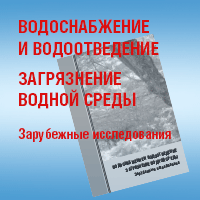№10|2014
DRINKING WATER SUPPLY
bbk 000000
UDC 628.112.23
The evaluation of exploitable potential and quality of the underground
water used by «Zelenogradvodokanal» Operations Department
Summary
The results of studying the regimes of underground water levels and water abstraction from the service carbonaceous aquifers are presented. Beginning from 2003 the Kasimovskii and Podol’sko-Miachkovskii complexes have been exploited under pressure-gravity conditions; whereas the Aleksinsko-Protvinskii complex – under pressure conditions. Reappraisal of the exploitable underground water potential on the territory under consideration was carried out with mathematical model approach using software package. The analysis of the long-term studies showed that at present the water table is not changing along with the marked decline of the underground water level in the service aquifers. In the wells completed in different aquifer systems the change of the underground water level of the next to the surface aquifer system in the sections with jurassic aquitard clays in their geologic profile does not depend on carbonaceous system level behavior (therefore, on water abstraction). In case the next to the surface aquifer lies directly on a carbon aquifer system the exploitation of the latter can affect the underground water level. However, under the circumstances the natural depth of occurrence of the next to the surface aquifer system is usually more than 3–5 meters; therefore, any further level decrease does not have any negative consequences for vegetation. The analysis of artesian water quality for the period from 1981 to 2012 for 18 organoleptic and composite indices, and three microbiological parameters is presented. The comparative analysis of artesian water quality of three aquifers is given alongside with the composition consistency of aquifer systems. The concentration of the elements typical for aquifers is presented.
Key words
water intake , monitoring , sanitary protection zone , artesian water quality , aquifer system , underground water storage , bacteriological and chemical pollution
The further text is accessible on a paid subscription.
For authorisation enter the login/password.
Or subscribe







